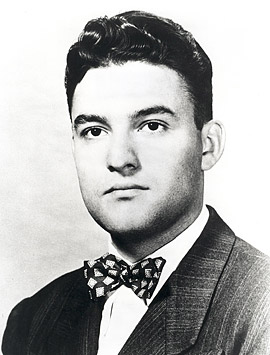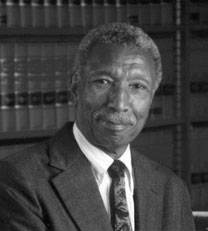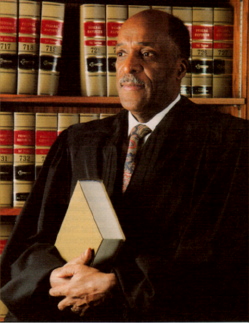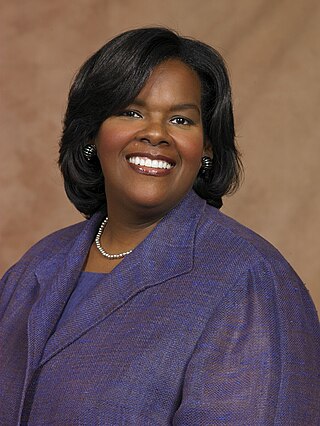
Thoroughgood "Thurgood" Marshall was an American civil rights lawyer and jurist who served as an associate justice of the Supreme Court of the United States from 1967 until 1991. He was the Supreme Court's first African-American justice. Prior to his judicial service, he was an attorney who fought for civil rights, leading the NAACP Legal Defense and Educational Fund. Marshall was a prominent figure in the movement to end racial segregation in American public schools. He won 29 of the 32 civil rights cases he argued before the Supreme Court, culminating in the Court's landmark 1954 decision in Brown v. Board of Education, which rejected the separate but equal doctrine and held segregation in public education to be unconstitutional. President Lyndon B. Johnson appointed Marshall to the Supreme Court in 1967. A staunch liberal, he frequently dissented as the Court became increasingly conservative.
Oliver Leon Brown was an African-American welder who was the plaintiff in the landmark 1954 U.S. Supreme Court case Oliver Brown, et al. v. Board of Education of Topeka, et al.

Constance Baker Motley was an American jurist and politician who served as a Judge of the United States District Court for the Southern District of New York.

Jack Greenberg was an American attorney and legal scholar. He was the Director-Counsel of the NAACP Legal Defense Fund from 1961 to 1984, succeeding Thurgood Marshall. He was involved in numerous crucial cases, including Brown v. Board of Education, which ended segregation in public schools. In all, he argued 40 civil rights cases before the U.S. Supreme Court, and won almost all of them.

Robert Lee Carter was an American lawyer, civil rights activist and a United States district judge of the United States District Court for the Southern District of New York.

Nathaniel Raphael Jones was an American attorney, judge, and law professor. As general counsel of the NAACP, Jones fought to end school segregation, including in the northern United States. From 1979 until 1995, he served as a United States circuit judge of the United States Court of Appeals for the Sixth Circuit before assuming senior status, and in 2002 retired to resume a private legal practice.
The Mexican American Legal Defense and Educational Fund (MALDEF) is a national non-profit civil rights organization formed in 1968 by Jack Greenberg to protect the rights of Latinos in the United States. Founded in San Antonio, Texas, it is currently headquartered in Los Angeles, California and maintains regional offices in Sacramento, San Antonio, Chicago, and Washington, D.C.

Alexander Pierre "A. P." Tureaud Sr. was an African-American attorney who headed the legal team for the New Orleans chapter of the NAACP during the Civil Rights Movement. With the assistance of Thurgood Marshall and Robert Carter from the NAACP Legal Defense and Educational Fund, A. P. Tureaud filed the lawsuit that successfully ended the system of Jim Crow segregation in New Orleans. That case paved the way for integrating the first two elementary schools in the Deep South.

Julius LeVonne Chambers was an American lawyer, civil rights leader and educator.
Elaine R. Jones is an American civil rights attorney and activist. She joined the NAACP Legal Defense Fund (LDF) in 1970 and in 1993 became the organization's first female director-counsel and president.

Bill Lann Lee is an American civil rights attorney who served as Assistant United States Attorney General for the Civil Rights Division for the United States Department of Justice Civil Rights Division under President Bill Clinton.
John A. Payton was an African-American civil rights attorney. In 2008, he was appointed the sixth president and director-counsel of the NAACP Legal Defense Fund serving in that post until his death. Prior to this, he was a partner at the law firm WilmerHale for 20 years.
John Winfield Walker was an American politician and a Democratic member of the Arkansas House of Representatives representing District 34 from January 2011 until his death.
This is a timeline of the civil rights movement in the United States, a nonviolent mid-20th century freedom movement to gain legal equality and the enforcement of constitutional rights for people of color. The goals of the movement included securing equal protection under the law, ending legally institutionalized racial discrimination, and gaining equal access to public facilities, education reform, fair housing, and the ability to vote.

Jacqueline Ann Berrien, often known as Jackie Berrien, was an American civil rights attorney and government official. From 2009 to 2014, Berrien served as chair of the Equal Employment Opportunity Commission (EEOC) under President Barack Obama. Prior to this, Berrien had served as Associate Director Counsel for the NAACP Legal Defense and Educational Fund.

Sherrilyn Ifill is an American lawyer and the Vernon E. Jordan, Jr., Esq. Endowed Chair in Civil Rights at Howard University. She is a law professor and former president and director-counsel of the NAACP Legal Defense Fund. She was the Legal Defense Fund's seventh president since Thurgood Marshall founded the organization in 1940. Ifill is a nationally recognized expert on voting rights and judicial selection. In 2021, Time named her one of the 100 most influential people in the world on its annual Time 100 list.
Melvyn Rosenman Leventhal is an American attorney known for his work as a community organizer and lawyer in the 1960s–70s Civil Rights Movement, and for being the husband of author Alice Walker for ten years; they were the first legally married interracial couple in Mississippi history.

Janai Nelson is an American lawyer, who currently serves as the President and Director-Counsel of the NAACP Legal Defense Fund (LDF).

Peabody Academy was established in 1880 in Troy, North Carolina, by the American Missionary Association (AMA) for the sole purpose of educating African Americans of Montgomery County, North Carolina. The Negro boarding school attracted students from all of the surrounding rural areas including towns now known as Biscoe, Mount Gilead, Candor, Pekin, Star, in addition to Troy, North Carolina. Peabody Academy was the only institution, at the time, that served the educational needs of African Americans.

Natasha Clarise Merle is an American lawyer from New York who serves as a United States district judge of the United States District Court for the Eastern District of New York.













